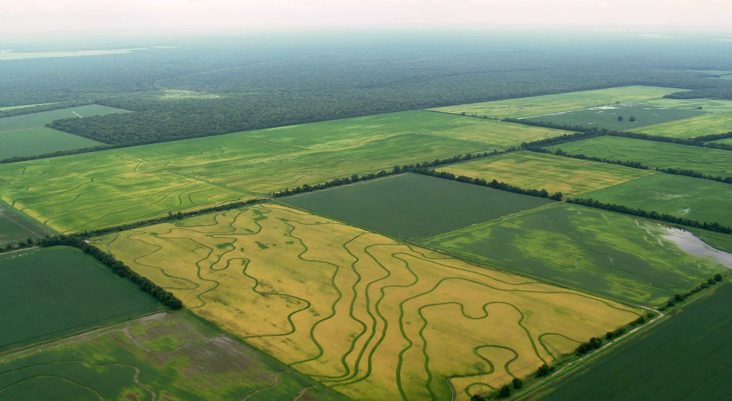Five slated to enter Arkansas Agriculture Hall of Fame
by January 4, 2023 5:46 pm 2,715 views

The Arkansas Agriculture Hall of Fame is slated to add five new members to its ranks this year. Class XXXV induction ceremonies are set for 11:30 a.m. March 3 at the Little Rock Convention Center, according to a release from the Arkansas Farm Bureau.
Inductees include Arkansas Century Farm owner/operator and philanthropist Ellis Bell of Forrest City; Arkansas State University professor of agricultural economics Bert Greenwalt of Jonesboro; innovative rice farmer Chris Isbell of Humnoke; veteran cotton farmer and industry leader Steve Stevens of Tillar; and the late Jessie (J.D.) Vaught of Horatio, a pioneer in contract livestock production.
“It’s an outstanding class of inductees reflecting the broad and diverse impact of agriculture across Arkansas,” said Hall of Fame’s committee chair Debbie Moreland of Roland. “These five include many different areas of agriculture. Agriculture is one of the great success stories of our state and that is sometimes overlooked. We’re pleased to bring recognition to these individuals who have impacted our state’s largest industry in such a positive way.”
The Arkansas Agriculture Hall of Fame began in 1987 to promote awareness and honor those who helped local communities and the state prosper. This year’s five inductees up the organization’s number of honorees to 181.
A fourth-generation minority farmer who spent decades overcoming obstacles, Bell now operates an Arkansas Century Farm established in 1878. After graduating in 1956 from Lincoln High in Forrest City, Bell worked 13 years as an aircraft mechanic and an insurance industry broker in St. Louis before returning to the farm in 1971 when his father retired. Bell earned a pilot’s license so he could fly back and forth to St. Louis, allowing him to maintain his work there and at the farm. Bell founded Bell’s Ag Tech and Bell Community Services (formerly known as Future Agriculture Resources for Minority Youth).
A professor of agricultural economics at Arkansas State University since 1991, Greenwalt co-founded and directs the college’s annual Agribusiness Conference and sponsors the Agribusiness Club, including trips to the Chicago Board of Trade and Federal Reserve Bank locations. He and his brother, Eric, nephew, Chad and mother, Idena, manage the Greenwalt Company farm in Hazen, striving to conserve natural resources, especially water. During 1999-2013, Greenwalt served six years as a director of the Federal Reserve Bank of St. Louis followed by seven years on the St. Louis Fed Agribusiness Council.
Isbell was the first farmer to grow Koshihikari rice outside of Japan, and the thrill of doing it spurred him on to develop and grow a premium variety of Yamanda Nishki rice used to make Japanese sake. When covid shut down Japan exports in 2020, Isbell had Japanese sake rice ready and waiting, and he now sells rice to sake breweries around the world. His product and Hot Springs’ sparkling spring water are now being used to create a new Origami Sake in Arkansas. His sustainability efforts include water-saving methods, solar fields helping power the farm and flooded fields for waterfowl in the offseason. Isbell was USA Rice Farmer of the Year in 1996 and Arkansas Farm Bureau’s Farm Family of the Year in 2019.
One of the more significant cotton seedbed-preparation innovations was first implemented in Arkansas on Stevens’ farm in the early 1990s. He was an early adopter of computerized-hole selection for irrigation and COTMAN (Cotton Management program), improving soil, water and insecticide use. Arkansas Discovery Farms selected Stevens’ fields for cotton research in 2013, and it has had more water-quality, water-use and nutrient-loss data collected on it than on any other farm in America. His contributions and commitment to improving farming have helped Arkansas generate millions of dollars using practices and technology developed on his farm. He served on the National Cotton Council Board and in leadership positions on the Cotton Inc. Board. In 2020, he was inducted into the Arkansas Conservation Hall of Fame.
A pioneer in contract livestock production, Vaught adapted early in both chicken and swine production and used technology like performance records and artificial insemination to improve purebred Charolais (early 1970s) and Angus cattle (1980s). He built chicken houses in the early 1960s and a contract hog facility in the mid 1970s, produced poultry from 1964-1999 and was a partner in Poultry House Cleanout Service from 1968-74. Vaught was a member of the Arkansas Farm Bureau state board of directors from 1991-99, a Sevier County Cattlemen’s Association officer and was instrumental in founding regional pork producer associations and the Grannis Trail Riders. He owned and operated a 400-acre family farm from 1963 until his death at age 82 on Dec. 26.
